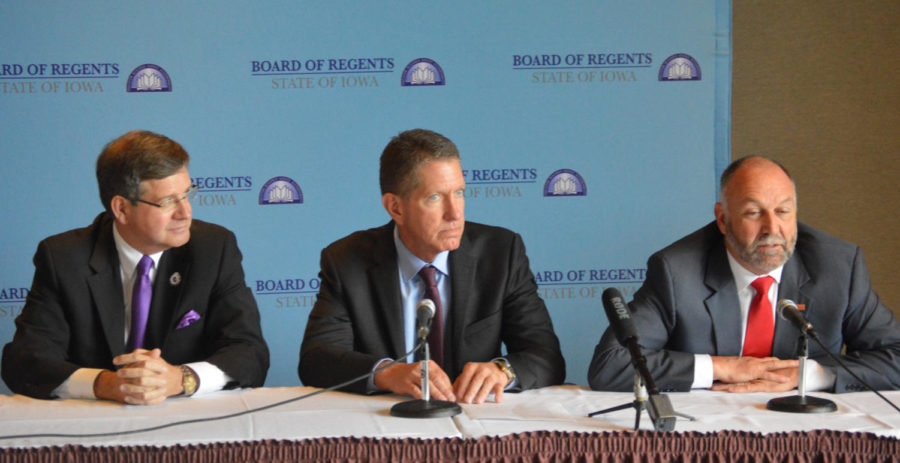Editorial: Tuition increase is a necessary evil
Matthew Rezab/Iowa State Daily
From left, UNI President Bill Ruud, Board of Regents President Bruce Rastetter and ISU President Steven Leath take questions from the media in the Scheman Building during the Board of Regents meeting on June 4.
September 13, 2015
The Board of Regents last week approved a tuition increase for in-state undergraduate students at Northern Iowa and Iowa State. The 3 percent tuition hike — which will equal about $100 per student — will go into effect next semester, spring of 2016.
This is the first time in three years that the Board of Regents will increase tuition for resident undergraduates at any of the state’s three public universities. The University of Iowa is exempt from the tuition increase because its student government told the Board of Regents last week that Iowa students couldn’t afford the increase.
But UI administration earlier asked for $4.5 million in additional funding for the school because a funding model proposed by the regents would redistribute state funds away from Iowa to Iowa State and UNI.
While this country still struggles with keeping higher education affordable for students and tuition increases can be difficult, this particular tuition increase appears to be the best-case-scenario for ISU and UNI students.
President Steven Leath said earlier this semester that the extra $100 from students will be going to alleviate issues caused by increasing enrollment. Dan Breitbarth, president of the ISU Student Government, told The Daily that the additional money from the tuition increase will go toward resources for students, though he said Leath hasn’t identified a specific area to where the money will go.
In addition to improving the student experience at Iowa State, if the raise does in fact help with increased enrollment issues, more frequent but smaller tuition increases are much more reasonable to ask of students rather than a larger one every few years.
These were the two main reasons Student Government leaders endorsed the increase.
Nobody likes to spend extra money. Students have said they are either confused by or don’t understand the tuition increase. Students especially are concerned about budgeting and any slight increase can seem like a larger burden.
But this increase is a necessary evil.
This money is intended to be an aspirin to our growing pains. Though a specific area hasn’t been identified, Breitbarth said Leath said he will focus that money on the students.
“The only reason I support it is I believe that, and if it doesn’t, I will make it publicly known,” Breitbarth said. “Leath and I are on the same page. We want to make sure the money goes to the right places.”
For example, the money could go to helping hire or better paying more professors to make sure the student experience in the classroom is not sacrificed for a lower price tag. The roughly $2 million increase in revenue could also go toward renovating classroom space or dining centers.
The lack of state appropriation the university received is affecting every part of each university community, and unfortunately, students are having to pay for it.
Resources need to be accommodated for. Students demand it. Improvements can’t be made for free.







